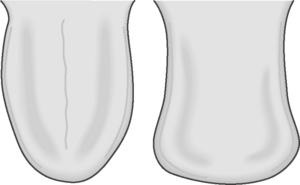CHAPTER 45 Post-Natal Depression
Chan Hou Wang Yan Jian Gui Fa Kuang (![]() ) means ‘absurd speaking, seeing ghosts and manic behaviour after childbirth’ and it indicates incoherent speech, visual and acoustic hallucination and hypomania. It was described by Wu Qian in his Golden Mirror of Medicine (1742).1
) means ‘absurd speaking, seeing ghosts and manic behaviour after childbirth’ and it indicates incoherent speech, visual and acoustic hallucination and hypomania. It was described by Wu Qian in his Golden Mirror of Medicine (1742).1
Aetiology
Severe loss of blood during childbirth
Severe loss of blood during childbirth causes Blood deficiency; since the Heart houses the Mind and governs Blood, deficient Heart-Blood fails to house the Mind which becomes depressed and anxious. In women with a pre-existing deficiency of Blood, this situation may arise even if the blood loss during childbirth is not particularly heavy. Deficiency of Blood will cause depression, resulting in a case of Mind Weakened; if the deficiency of Blood gives rise also to anxiety and insomnia, it may result in Mind Weakened and Unsettled.2
Identification of patterns and treatment
Heart-Blood deficiency
Herbal treatment
a Prescription
Explanation
b Prescription
Explanation
The formula Gui Pi Tang, already explained, tonifies Spleen-Qi and Heart-Blood and calms the Mind: it is ideally suited to treat post-natal depression and insomnia. This formula is also recommended by Wu Qian in his Golden Mirror of Medicine for post-natal depression from worry, pensiveness and sadness.4
Stay updated, free articles. Join our Telegram channel

Full access? Get Clinical Tree



